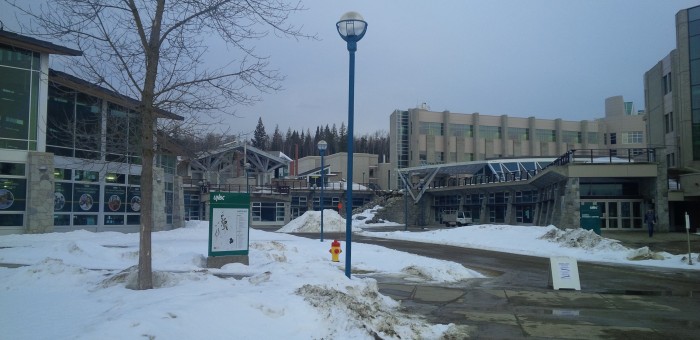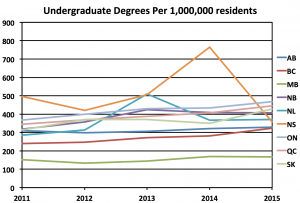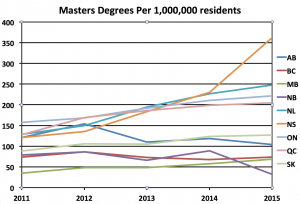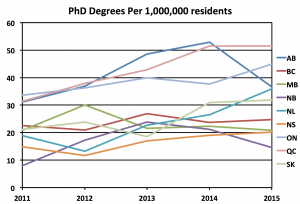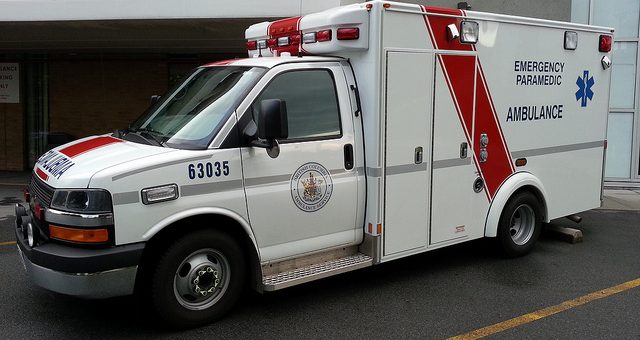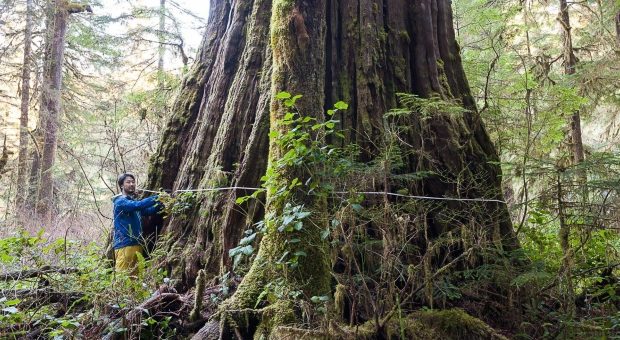Jobs
On the need for more engineers to be trained in BC
At every level — undergraduate, master’s, and PhD, B.C. lags behind other provinces in terms of the number of engineers it graduates per capita.
Of the 9 provinces that offer engineering undergraduate degrees, BC ranks a dismal 8th. It ranks 7th in Masters and 6th in PhDs (see graphs below using data from Canadian Engineers for Tomorrow Share: Trends in Engineering Enrolment and Degrees Awarded 2011-2015).
Quebec and Ontario graduated 40% more undergraduate engineers per capita in 2015 than BC. They graduated 280% and 300%, respectively, more Masters Degrees per capita while Nova Scotia graduated 500% more per capita. And Quebec also graduates more than twice the number of PhDs per capita than BC.
In fact, BC is one of the lowest ranked jurisdictions in the world in terms of engineering PhDs awarded per capita. To compound this discrepancy further, BC has the strongest projected employment growth for engineers in Canada.
This is an unacceptable situation for a jurisdiction attempting to position itself as an innovator in the emerging 21st century economy. It’s particularly troubling as universities in BC are chomping at the bit to expand their offerings. For example, an exciting opportunity exists in Squamish to create a innovative centre for clean energy research, training and industry partnership. UNBC is also hoping to establish an engineering program to meet the demand for professional engineers in northern communities.
To pick up on this theme I asked the Minister of Advanced Education how her ministry was going to facilitate the development of these programs and increase the number of engineering graduates in British Columbia, and in particular, UNBC. As you will see from the video and text below, the BC Liberals were quite unruly during question period and had to be reprimanded by the Speaker a number of times.
Video of Exchange
Question
A. Weaver: At every level — undergraduate, master’s, and PhD, B.C. lags behind other provinces in the number of engineers it graduates per capita. Of the nine provinces that offer engineering undergraduate degrees, B.C. ranks a dismal eighth. It ranks seventh in master’s and sixth in PhDs. Quebec and Ontario graduated 40 percent more undergraduate engineers per capita in 2015 than B.C. They graduated 280 and 300 percent, respectively, more master’s degrees than B.C., while Nova Scotia graduated 500 percent more master’s degrees than B.C. Quebec has more than twice the number of PhD graduates. In fact, B.C. is one of the lowest-ranked jurisdictions in the world in terms of engineering PhDs per capita.
To compound this discrepancy further, B.C. has the strongest projected growth, for engineers in Canada. There are post-secondary institutions eager to fill the need. UNBC has been trying to get an undergraduate engineering program…
Mr. Speaker: Member, your question.
A. Weaver: …for years. The engineering department at UBC wants to build a tech campus in Squamish.
To the Minister of Advanced Education, Skills and Training, how is her ministry going to facilitate the development of these programs and increase the number of engineering grads in British Columbia?
Interjections.
Mr. Speaker: Members.
Answer
Interjection.
Hon. M. Mark: Sorry, what was that?
Interjection.
Hon. M. Mark: Yeah, exactly. It’s not you asking the question. I’m the one answering the question, through the Speaker.
Interjections.
Mr. Speaker: Members.
Hon. M. Mark: No, it’s okay. I’m used to this. I’m used to this circus on the other side. It has only been a week, but it’s been fun.
Interjections.
Mr. Speaker: Members.
Hon. M. Mark: I thank the member for Oak Bay–Gordon Head for the question.
Interjection.
Hon. M. Mark: Well, of course I do. I like to stand in this House as an advocate for post-secondary education. For the last 16 years…. In the first 21 days on the job, I had a chance to travel the province and hear from students and get to see STEM in action — science, technology, engineering and math.
We’re going to do something about this on this side of the House to send a message to students that we’re on their side, that we’re going to invest in their education. We’re going to invest in the tech sector.
We know that the tech sector is a $26 billion industry. Our friends on the other side of the House remind us that we’re not interested in jobs, but we need to make sure that we’re training people up. We’re going to make sure that those 100,000 people that are contributing to the economy are trained up in engineering. So we’re going to increase co-op placements. We’re going to increase apprenticeship placements. We’re going to make sure that the trade seats are relevant all across the province, not just select regions in the province.
I look forward to working with the member for Oak Bay–Gordon Head on increasing the seats in engineering in B.C.
Supplementary Question
A. Weaver: If ever there was any doubt why this boisterous bunch needed to be put in a time-out, today is the justification for that.
Interjections.
A. Weaver: In mathematics, hon. Speaker, “QED” is often used to demonstrate exactly what I was just saying.
UNBC has proven that if we train people in the north, they stay in the north. In fact, more than half of their 13,000 alumni live in the north, contributing to the society, culture and employment base. Engineering should be offered at UNBC. It would add to those figures.
I recognize that 16 years of rule by the Luddites opposite, who do not understand the importance of the new economy, abandoned rural B.C. and left them on the hook. They abandoned development in rural B.C….
Interjections.
Mr. Speaker: Member, please be seated for a moment.
Members, we are reminded that when someone is speaking, we will listen with good manners.
A. Weaver: My question to the Minister of Advanced Education, Skills and Training is: what is your ministry doing to ensure vibrant educational opportunities are available across all disciplines in our northern communities, in order to allow these communities to take advantage of the emerging opportunities in the 21st century economy that have been left out because of 16 years of incompetent rule by the B.C. Liberals?
Answer
Hon. M. Mark: I’m so pleased to hear a question about post-secondary advocacy in this House, because it’s about time that we have a government that’s going to advocate for the students all across British Columbia and make sure that we have those seats available. It is unacceptable that that government brought us to eighth place, in this province….
Interjections.
Hon. M. Mark: Pardon me? It’s exciting in here. I love the excitement. It’s about time that people are standing up for post-secondary education instead of standing in the way.
We’re going to get to increasing those seats across B.C., up in UNBC. We’re going to make sure that we’re investing in jobs in the 21st century. We’re going to make sure that we’re not standing the way by increasing debt and tripling tuition, like what was done under the last government in 16 years.
We are going to stand beside the students in British Columbia, and we made those measures, in the first 60 days of forming government, by reducing student debt, by making sure that we increase seats for students in the trade sector and the engineering sectors. We’re standing beside students in this province, and we’re sending a message that we are going to invest in them, not stand in their way.
Removing Port Mann & Golden Ears bridge tolls is fiscally reckless
Today the BC NDP announced that they would be removing the tolls on the Port Mann and Golden Ears bridges in Metro Vancouver effective September 1, 2017. While this may seem like a good idea at face value, it is profoundly troubling from a policy perspective.
In the 2017 election campaign the BC NDP announced that if elected they would scrap the tolls on these two bridges. The BC Liberals countered with a promise to limit tolls to $500/year. In their subsequent and bizarre throne speech this past summer they promised to remove this cap and eliminate the tolls entirely. The BC Greens were the only party to campaign on developing a rational tolling system through consultation with and municipalities across Metro Vancouver. We did not promise to eliminate the tolls.
Eliminating the tolls will come at a cost.
- $86 million for the rest of 2017/18 and $135 million annually thereafter for the Port Mann bridge
- $34 million for the rest of 2017/18 and likely more than $120 million annually thereafter for the Golden Ears bridge. Because this bridge is owned by Translink, the government will have to negotiate a long-term solution.
- 180 people will lose their jobs
- The outstanding debt for the Port Mann Bridge is $3.6 billion; the outstanding debt for the Golden Ears Bridge is $1.1 billion. $4.7 billion will now be moved from self supporting debt to taxpayer supported debt.
Increasing taxpayer supported debt is worrying. The Province’s borrowing rates are largely determined by our credit rating and overall taxpayer supported debt load. Increasing this debt load risks the potential of downgrading our credit rating which in term would increase borrowing rates on the entire provincial debt.
More than $250 million annually will now have to come from other sources. This is money that is desperately needed in health care, public education, and social services.
Eliminating tolls will increase congestion in Metro Vancouver as more people turn to their cars. It sends precisely the wrong message to commuters who may now opt out of public transit.
Finally, the introduction of user-pay systems to support the construction of major infrastructure projects is well established as an efficient means of advancing such projects in a timely fashion. When the infrastructure is paid off, the tolls are removed. This is how the Coquihalla highway was built in BC. In fact, those who have visited Quebec, Ontario, PEI, or Nova Scotia will have experienced tolling on various bridges and roads.
Today’s announcement fulfilled what can only be described as a desperate attempt by the BC NDP to pander to voters south of the Fraser. Their justification of fairness is shallow. Residents of Vancouver Island, the Gulf Islands or Haida Gwaii will point out that the BC Ferries are part of our highway system. A compelling case of fairness could be made to argue that all ferry fares should be eliminated (there are already no fares on the inland ferries in the Kootenays). Obviously this won’t happen.
How would the rest of BC react if the BC Green Party campaigned on eliminating the fares on all BC Ferries. I suggest that there would be outrage – and rightly so – in the face of this reckless approach to public policy.
Below is the media statement I released today on this topic.
Media Statement
Weaver statement on government’s decision to remove bridge tolls
For Immediate Release
August 25, 2017
VICTORIA, BC – Andrew Weaver, leader of the B.C. Green caucus, issued the following statement today in response to the government’s removal of tolls on the Port Mann and Golden Ears Bridges.
“It’s unfortunate that the government has decided to proceed with this reckless policy,” said Weaver.
“There is no question that the affordability crisis facing so many British Columbians is a significant concern. However, this policy is high cost and low impact. There are lots of good, high return-on-investments decisions that government can make, such as education, student housing and child care. It is disappointing that the first major measure that this government has taken to make life more affordable for British Columbians will add billions of dollars to taxpayer-supported debt. Moreover, making such a massive addition to our debt risks raising interest on all debt, which ultimately prevents government from being able to invest more in important social programs.
“Tolls are an excellent policy tool to manage transport demand. Transport demand management reduces pollution and emissions, alleviates congestion and helps pay for costly infrastructure. That’s why, at the negotiating table when preparing our Confidence and Supply Agreement, we ensured that a commitment was included to work with the Mayors’ Council consultation process to find a more fair and equitable way of funding transit for the long-term. We look forward to that commitment being met so that British Columbians can have an evidence-based, truly fair approach to this file.”
-30-
Media contact
Jillian Oliver, Press Secretary
+1 778-650-0597 | jillian.oliver@leg.bc.ca
My statement on the Fair Wages Commission announcement
Today the government announced its intention to use a new at-arm’s-length Fair Wages Commission to establish a pathway to a minimum wage of at least $15 per hour. The Fair Wages Commission will further be tasked with overseeing regular rate reviews. The commission will bring forward recommendations regarding strategies to address the discrepancy between minimum wages and livable wages. It will make its first report on a new minimum wage within 90 days of its first meeting.
The establishment of a Fair Wages Commission was a key element of the B.C. Greens 2017 election platform and was included in the Confidence and Supply Agreement (CASA). Below I provide my comments on the BC Government’s announcement.
Media Statement
Weaver statement on Fair Wages Commission announcement
For immediate release
August 15, 2017
VICTORIA, BC – Andrew Weaver, leader of the B.C. Green caucus, issued the following statement today in response to the government’s announcement that it plans to use the Fair Wages Commission to achieve a minimum wage of $15/hour by 2021. The establishment of a Fair Wages Commission was a key element of the B.C. Greens 2017 election platform and was included in the Confidence and Supply Agreement (CASA) signed by Dr. Weaver and Premier Horgan.
“Although I am pleased to see an important piece of our agreement move forward, I am concerned that the apparent addition of a 2021 timeline is prejudicial to the work of the Fair Wages Commission. The Commission falls under the Confidence and Supply Agreement between the BC NDP and BC Green caucuses. The 2021 timeline had not been agreed upon and is, in fact, contradictory to the intention of depoliticizing the Fair Wages Commission.
“The Fair Wages Commission should determine the timeline for minimum wage increases based on evidence and through consultation with stakeholders. The Commission must consult with small businesses, which are the backbone of our economy, to ensure they can continue to thrive. The timeline and wage increases should not be made for political purposes and should not be arbitrarily set in advance.
“British Columbians are facing skyrocketing costs of living and increasing income insecurity as the economy changes rapidly. Minimum wage is just one way we can move towards all British Columbians having a liveable income. The Fair Wages Commission must be empowered to make recommendations at arms-length based on evidence to ensure that wage increases create better income security for all British Columbians.”
-30-
Media contact
Jillian Oliver, Press Secretary
+1 778-650-0597 | jillian.oliver@leg.bc.ca
Bill M217 — First Responders Act, 2017
Today in the legislature I introduced a private member’s bill titled First Responders Act, 2017. This Bill amends the Fire and Police Services Collective Bargaining Act to include paramedics and emergency dispatchers.
As it stands now, paramedics are not considered to be an essential service. By including them in the collective bargaining act, we would eliminate labour disputes and the use of strikes or lockouts. Instead, this bill would give them the ability to resolve disputes through binding arbitration.
It would help paramedics and dispatchers – and it would help the public. In fact, BC paramedics have been asking for this change. Elections BC recently approved their petition for the Initiative to Amend the Fire and Police Services Collective Bargaining Act to include ambulance service paramedics and dispatchers.
Below are the video and text of the introduction of my bill together with our accompanying media release.
Video of Introduction
Text of Introduction
A. Weaver: I move that a bill intituled First Responders Act, 2017, of which notice has been given, be introduced and read a first time now.
Motion approved.
A. Weaver: I’m pleased to be introducing a bill intituled the First Responders Act, 2017. This bill amends the existing fire and police services Collective Bargaining Act to also include paramedics and emergency dispatchers, giving them the same collective bargaining rights as other first responders.
As it stands now, paramedics are not considered as an essential service. By including them in the Collective Bargaining Act, we would eliminate labour disputes and the use of strikes or lockouts. Instead, this bill would give them the ability to solve disputes through binding arbitration. It would help paramedics and dispatchers, and it would help the public.
As citizens, we owe the first responders sincere gratitude for helping us in times of crisis. As members of the Legislative Assembly, we are shamefully indebted to them for leaving them to shoulder the weight of a horrific drug overdose epidemic. We allowed them to become overworked while under-supported. I hope that this bill will begin to repair that strain, and it represents a proactive attempt to deal with the initiative that has been brought forward by Elections B.C.
I move that the bill be placed on the orders of the day for second reading at the next sitting of the House after today.
Bill M217, First Responders Act, introduced, read a first time and ordered to be placed on orders of the day for second reading at the next sitting of the House after today.
Media Release
VICTORIA B.C. – “Paramedics and emergency dispatchers are an essential service, and should be treated as such,” says Andrew Weaver, Leader of the B.C. Green Party.
“As citizens, we owe first responders sincere gratitude for helping us in times of crisis.
We are indebted to them as they’ve had to shoulder the additional weight of a horrific drug overdose epidemic. We allowed them to become overworked while under supported. I hope that this bill will begin to repair that strain.”
Today in the B.C. Legislature MLA Weaver will table a bill intituled the First Responders Act, 2017. The bill amends the existing Fire and Police Services Collective Bargaining Act to also include paramedics and emergency dispatchers, giving them the same collecting bargaining rights as other first responders. It fulfills the changes called for in a petition issue by paramedics through Elections B.C.
“As it stands now, paramedics are not considered as an essential service. By including them in the collective bargaining act, we would eliminate labour disputes and the use of strikes or lockouts. Instead, this bill would give them the ability to resolve disputes through binding arbitration.
“The amendments in this Act would help paramedics and dispatchers – and it would help the public.”
– 30 –
Media contact
Mat Wright, Press Secretary
+1 250-216-3382 | mat.wright@leg.bc.ca
Reinvesting in British Columbia’s Forest Sector
Despite today’s announcement that $150 million will be invested in reforestation, a wave of unemployment is sweeping across rural B.C. because of government policies that have devastated the province’s once-great forest resource.
Premier Christy Clark now says the appropriate response is to put forest industry people to work building roads and bridges. B.C. really needs a bigger vision than that – especially since the provincial government is complicit in the sector’s mismanagement in the first place.
In the late 1990’s and early 2000’s, a pine beetle infestation erupted. The pandemic was exacerbated by successive B.C. NDP and Liberal governments who pursued policies that created largely monoculture forests. Pine trees grow fast and the government encouraged their use as the “preferred” species for replanting huge swaths of land that had been clear-cut. At the same time, the government’s shortsighted forest fire suppression policies snuffed out fires that would have naturally created a more diversified landscape. (Forest fires play a vital ecological role and, where possible, should be monitored closely but left to safely burn.)
The result: huge plantations of pine trees flourished. As climate change reduced the severity of B.C. winters, they became perfect breeding grounds for pine beetles and the largest beetle attack ever seen in North America was unleashed destroying millions of trees over a massive area. As the epidemic spread, and the health of B.C.’s forests deteriorated, the government was forced to dramatically increasing the allowable cut.
In recent years, the decline of the province’s forests has been masked by the increased cutting of dead trees in so-called salvage logging – but there is no hiding the fact that nearly 60% of the merchantable pine has been destroyed by the beetle invasion. Today, even the dead trees are running out and across rural B.C. forest industry jobs have entered a period of rapid, devastating decline.
Recent labor force statistics show that while the number of jobs in Metro Vancouver are up, there has been a drop in rural B.C. The unemployment rate in Mainland/Southwest B.C. is at 5%, but it is 8.2% in Thompson-Okanagan and 10.5% in North Coast/Nechako. In December, Tolko Industries shut down its Nicola Valley sawmill, taking 203 high-paying jobs out of a small community that will struggle without them.
And that’s just the start of it.
Because of the declining timber supply, the province’s chief forester has been forced to reduce the allowable annual cut (AAC). In Prince George, the AAC is being reduced by 50%. In Quesnel the AAC is dropping to 1.6 million cubic metres from 4 million cubic metres. Last March, in the Merritt Timber Supply Area, the AAC was cut to 1.5 million from 2.4 million cubic metres.
If you reduce the number of trees being cut, there will be a corresponding drop in the number of loggers, truck drivers and mill workers who have jobs. The Truck Loggers Association recently heard at its annual convention that five or six pulp and paper mills will close in the next two to six years. Thousands of jobs will be lost.
Over the past 25 years, NDP and Liberal governments’ have tried to position themselves as defenders of the forest industry, by setting the AAC at unsustainable levels, instead of concentrating on value added and diversification. The consequences of this are now coming home to roost. Premier Clark’s plan to increase spending on infrastructure projects to address the economic divide between rural and urban B.C. may deliver much needed infrastructure but will not create a long term solution.
What rural B.C. really needs are healthy forests and a vibrant small/medium family business culture that can provide sustainable logging, support local economies and provide environmental diversity over the long term. That’s how communities grow and prosper.
We need to rethink our forest management in the context of the realities of the 21st century – global warming; technological change; international competition; not to mention the immediate issues of growing protectionism, and the soft wood lumber dispute. Our tenure structures date back to the 19th century, and our mills have been starved of investment over recent years. The investment that has taken place, has usually replaced people with machines.
Rather than manage our forests, the BC Liberals have toyed with privatizing them. It is worth remembering that in 2001, Mike De Jong, then Minister of Forests, told a meeting of silviculturalists that BC’s Crown forests would be “unrecognizable” when he and the Liberals were finished with them.
Our forests are our collective asset, and we need to ensure that first and foremost, British Columbians are fully benefiting from them, not just corporations and vested interests.
We need to start a new conversation about our forests. We need to ask:
- How do we maximize the benefits of our forest industry?
- How do we get the greatest value from our fibre?
- How do we ensure that our rural and remote communities are included in the benefits?
- What is the most effective long term management structure?
- How do we integrate indigenous people and communities in decision making?
- How are we going to manage sustainability, long term productivity, mitigating climate change and enhancing secondary manufacturing?
A redesign of our forest management is long overdue and would be priority of a BC Green Government. We need to truly end the war in the woods, and ensure that our forests work for all of us.

